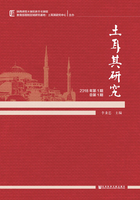
五 结语
土耳其国家身份的变化根植于社会的发展变革,但其重塑进程受到埃尔多安和正义与发展党的强力引导。政治领袖和执政党的介入实现了这一过程从“自发”到“自觉”的转变,也使国家身份重塑的影响即时体现在土耳其的内外政策中。从动机上看,埃尔多安有意在变化了的历史条件下修改凯末尔主义中有关国家定位的不完整的内容;从效果上看,他正借助于土社会的现实,糅合自己的意识形态偏好与政治理想,塑造着一个更贴近现实、更具代表性的“新土耳其”。
在非暴力革命的环境中,国家身份重塑将是一个长期的、反复的过程。一方面是由于矫枉常常过正,旧身份认同的反弹会刺激埃尔多安和正义与发展党在政策层面上用力过猛,由官方倡导的、新的身份认同与社会现实需要经过反复的磨合才能达到某种相对稳定的平衡。二是由于土耳其国家本身也还处于变动之中,尤其在中东大国权力消长、地区秩序重组的大环境下,埃尔多安和正义与发展党也在不断调试“内”与“外”的关系。受此影响,未来土耳其的政策仍将出现一定程度的摇摆,但国家身份重塑的大方向恐难以改变。正如此前的土耳其镌刻着凯末尔主义的特征一样,正在形成的“新土耳其”将不可避免地带有埃尔多安和正义与发展党的鲜明印记。
(缺英文标题)
Li Yanan
Abstract:Turkish national identity has being reshaped under the leadership of the Justice and Development Party (AKP)since the ‘Arab Spring’ in 2011.It reoriented Turkey from a quasi-European country to a virtual Middle-Eastern one and replaced the Kemalist nationalism with an Islamic one,which be called as Erdoganism revolution or,occasionally,a ‘counterrevolution’.The transformation is driven comprehensively by many factors:the “Islamism” and “neo-Ottomanism” ideology of AKP; the changed ruling foundation; and the regional upheaval as an external impetus.National identity-reshaping impacts immediately on Turkey's domestic and foreign policies.Its diplomatic strategy began to “looking east”,gradually alienating United States and EU; its regional policy are getting more aggressive,deeply involving in external conflicts and trying hard to cultivate allies and proxies in the Islamic world; its domestic policy are controversial,easing the restrictions on religious and introducing more Islamic education,which raised the fear of social-Islamization.
Keywords:Turkey;National-identity;AK-Party;Islam
Author Profile:Li Yanan is a research assistant of Middle East Institute, China Institutes of Contemporary International Relations. She studies on Turkish diplomacy and politics, International relations.
[1]《土耳其研究》2018年第1期(总第1期),第42~62页。
[2]孙溯源:《集体认同与国际政治:一种文化视角》,《现代国际关系》2003年第3期。
[3]秦亚青:《国家身份、战略文化和安全利益》,《世界经济与政治》2003年第1期。
[4]Ayla Gol,Turkey Facing East:Islam,Modernity and Foreign Policy,Manchester and New York:Manchester University Press,2013,pp.65-68.
[5]M.Hakan Yavuz,Islamic Political Identity in Turkey,New York:Oxford University Press,2003,p.46.
[6]在农村地区,世俗法律和宗教法律曾长期并存。参见Ihsan Yilmaz,“Secular Law and the Emergence of Unofficial Turkish Islamic Law,”Middle East Journal,Vol.56,No.1,2002。
[7]Angel Rabasa and F.Stephen Larrabee,“The Rise of Political Islam in Turkey,”RAND Report,2008.
[8]昝涛:《土耳其模式:从激进世俗化到温和伊斯兰主义》,《新疆师范大学学报》2012年第2期。
[9] M.Hakan Yavuz,Islamic Political Identity in Turkey,New York:Oxford University Press,2003,p.243.
[10]正义与发展党提出,真正的世俗主义应当允许在没有国家干预的前提下开展宗教活动,即世俗主义与宗教自由并存。参见Philip W.Sutton & Stephen Vertigans,“The Established and Challenging Outsiders:Resurgent Islam in Secular Turkey,”Totalitarian Movements & Political Religions,Vol.3,No.1,2002,pp.58-59。
[11]Ihsan Yilmaz & Galib Bashirov,“The AKP after 15 Year:Emergence of Erdoganism in Turkey,”Third World Quarterly,2018,https://www.tandfonline.com/doi/pdf/10.1080/01436597.2018.1447371?needAccess=true.
[12]Dilly Hussain,“The Revival of Ottomanism in Shaping Turkey's Influence in the Muslim World,”Foreign Policy Journal,https://www.foreignpolicyjournal.com/2017/09/26/the-revival-of-ottomanism-in-shaping-turkeys-influence-in-the-muslim-world/.
[13]Loannis N.Grigoriadis,The Davutoglu Doctrine and Turkish Foreign Policy,Hellenic Foundation for European and Foreign Policy,Working Paper No.8/2010,p.5.
[14]Zeyno Baran, Torn Country:Turkey between Secularism and Islamism,Hoover Institution Press,2010,pp.44-49.
[15] Eric Edelman,“Erdogan's Counter-Revolution,”https://www.weeklystandard.com/eric-edelman/erdogans-counter-revolution.
[16]Yuksel Taskin,“Seeking Legitimacy for the Conservative Elite,”in Kenan Aksu ed.,Turkey:A Regional Power in the Making,Cambridge Scholars Publishing,2013,pp.86-88.
[17]Pavel Shlykov and Alexey Malashenko,“Revolution:Where is Turkey Going?” https://carnegieendowment.org/2011/09/22/anti-kemalist-revolution-where-is-turkey-going-event-3479.
[18]Dimitar Bechev,“Turkey's Rise as a Regional Power,”European View,December 2011,Vol.10,Issue 2,pp.173-179.
[19]有学者认为这一时期正义与发展党没有启动国家身份重塑进程的原因有二:一是出于实用主义原则,通过稳定经济获得更大的合法性;二是奉行凯末尔主义的军队仍然掌控着巨大的权力,正义与发展党要尽量避免触怒军队,免受埃尔巴坎政府被颠覆的命运。参见Ihsan Yilmaz & Galib Bashirov,“The AKP after 15 Years:Emergence of Erdoganism in Turkey,”Third World Quarterly,Published online 22 Mar 2018,https://www.tandfonline.com/doi/full/10.1080/01436597.2018.1447371.(检索日期:2018年6月)。
[20]Chris Morris,The New Turkey:The Quiet Revolution on the Edge of Europe,UK:Granta Books,2007,p.183.
[21]Eric Edelman,Svante Cornell,Aaron Lobel and Halil Karaveli,“Turkey Transformed:The Origins and Evolution of Authoritarianism and Islamization Under the AKP,”A Report from Bipartisan Policy Center,October 2015,pp.41-50.
[22]Menderes Cinar,“Turkey's ‘Western’ or ‘Muslim’ Identity and the AKP's Civilizational Discourse,”Turkish Studies,Vol.19,2018,pp.176-197.
[23]Steven A.Cook,“Turkey's Identity Crisis,”https://www.theatlantic.com/international/archive/2017/06/turkey-erdogan-akp/531468/.
[24]Hsan D.Dai,“Transformation of Islamic Political Identity in Turkey:Rethinking the West and Westernization,” Turkish Studies,Vol.6,2005,pp.21-37.
[25]Agnes Czajka and Edward Wastnidge,“‘The Centre of World Politics?’ Neo-Ottomanism in Turkish Foreign and Domestic Politics,” http://web.isanet.org/Web/Conferences/GSCIS%20Singapore%202015/Archive/a1b05e35-80f6-40ae-9c56-b5708c5c321e.pdf.
[26]Senem Aslan,“Different Faces of Turkish Islamic Nationalism,”https://www.washingtonpost.com/news/monkey-cage/wp/2015/02/20/different-faces-of-turkish-islamic-nationalism/?noredirect=on&utm_term=.94affed130d5.
[27]但是埃尔多安和正义与发展党倾向于忽视境内的非穆斯林少数族群,如犹太人、亚美尼亚人、希腊人以及天主教徒、基督教徒等,他们甚至没有被纳入民族主义的动员范围内。对于这些族群而言,凯末尔的民族国家和民族主义与埃尔多安提倡的伊斯兰民族主义并无本质区别,前者试图通过同化吸收其异质性,后者尝试通过打压消灭其异质性,均未认可其平等地位和平等权利。参见Jeffrey Haynes,“Politics,Identity and Religious Nationalism in Turkey:from Ataturk to AKP,” Australian Journal of International Affairs,Vol.64,2010,pp.312-327。
[28]John Halpin,Michael Werz,Alan Makovsky and Max Hoffman,“Is Turkey Experiencing a New Nationalism:An Examination of Public Attitudes on Turkish Self-Perception,” A Report from Center for American Progress,https://www.americanprogress.org/issues/security/reports/2018/02/11/445620/turkey-experiencing-new-nationalism/.(检索日期:2018年6月)
[29]Gareth Jenkins,“ Revolution and Counter-Revolution:Kemalism,the AKP and Turkey at 90,”The Turkey Analyst,Vol.6,No.20,https://www.turkeyanalyst.org/publications/turkey-analyst-articles/item/69-revolution-and-counter-revolution-kemalism-the-akp-and-turkey-at-90.html.
[30]Dov Waxman,“Islam and Turkish National Identity:A Reappraisal,”Turkish Yearbook of International Relations,January 2000,http://file.setav.org/Files/Pdf/islam-and-turkish-national-identity--ankara-univ.-year-book-2000.pdf.
[31]H.Ertug Tombus and Berfu Aygenc,“(Post-)Kemalist Secularism in Turkey,”Journal of Balkan and Near Eastern Studies,Vol.19,2017,pp.70-85.
[32]John Halpin,Michael Werz,Alan Makovsky and Max Hoffman,“Is Turkey Experiencing a New Nationalism:An Examination of Public Attitudes on Turkish Self-Perception,”A Report from Center for American Progress,https://www.americanprogress.org/issues/security/reports/2018/02/11/445620/turkey-experiencing-new-nationalism/.
[33]Aaron Stein, Turkey's New Foreign Policy:Davutoglu,the AKP and the Pursuit of Regional Order,Published by the Royal United Services Institute for Defense and Security Studies,2014,pp.9-10.
[34]埃尔多安认为,欧盟在人权和民主问题上一直对土耳其使用双重标准,所谓入盟谈判只是用来与土讨价还价、诱骗土屈服让步的筹码;欧盟从未想过真正接纳土耳其,根本原因在于土耳其的“穆斯林身份”。参见“Erdogan:EU doesn't want Turkey because ‘Majority is Muslim’,”https://www.rt.com/news/347953-erdogan-eu-turkey-muslim/。
[35]Varun Vira,“The Neo Ottomans:Looking East without Looking Back,”Foreign Policy Journal,https://www.foreignpolicyjournal.com/2010/06/15/the-neo-ottomans-looking-east-without-looking-back/.
[36]“Turkey and the Middle East:Looking East and South,”the Economist,https://www.economist.com/middle-east-and-africa/2009/10/29/looking-east-and-south.
[37]Mehmet Ozkan,“Turkey,Islamic Politics and the ‘Turkish Model’,” Strategic Analysis,Vol.37,2013,pp.534-538.
[38]Kemal Kirişci,“The Rise and Fall of Turkey as a Model for the Arab World,”Op-ds in Brookings Institution,https://www.brookings.edu/opinions/the-rise-and-fall-of-turkey-as-a-model-for-the-arab-world/.
[39]Omer Taspinar,“Turkey's Middle East Policies:Between Neo-Ottomanism and Kemalism,”Carnegie Papers,No.10,September 2008,pp.6-7,https://carnegieendowment.org/files/cmec10_taspinar_final.pdf.
[40]土耳其与以色列曾经历过一段双边关系的蜜月期,但矛盾最终还是围绕穆兄会问题爆发。埃尔多安希望能说服巴沙尔·阿萨德将叙利亚的穆兄会组织合法化、准许其参与政治进程,但遭到严词拒绝。参见Bayram Balci,“Turkey's Relations with the Syrian Opposition,”https://carnegieendowment.org/2012/04/13/turkey-s-relations-with-syrian-opposition-pub-47841。(检索日期:2018年5月)
[41]库尔德政党对埃尔多安和正义与发展党的威胁不仅体现在民族问题和选票分配上,也体现在社会意识形态上。人民民主党不仅代表库尔德人,还得到自由主义者、同性恋者和跨性别者等边缘群体的支持,这超出了以埃尔多安为代表的伊斯兰主义者的容忍底线。参见Sabri Ciftci,The Many Faces of Kurdish Political Representation in Turkey,Contemporary Turkish Politics,POMEPS Studies 22,Rice University Baker Institute for Public Policy,December 7,2016,pp.50-53。
[42]Eric Edelman,“Erdogan's Counter-Revolution,”https://www.weeklystandard.com/eric-edelman/erdogans-counter-revolution.
[43]Cinar Kiper,“Muslim Light:What's Behind Turkey's Islamization and the Protests Against It,”https://www.theatlantic.com/international/archive/2013/06/muslim-light-whats-behind-turkeys-islamization-and-the-protests-against-it/276576/.
[44]Recep Tayyip Erdogan,“A Woman Is above all else a Mother,”https://www.theguardian.com/world/2016/mar/08/recep-tayyip-erdogan-a-woman-is-above-all-else-a-mother-turkish-president.
[45]Xanthe Ackerman and Ekin Calisir,“Erdogan's Assault on Education,” Foreign Affairs,December 23,2015,https://www.foreignaffairs.com/articles/turkey/2015-12-23/erdogans-assault-education.
[46] Jeremy Salt,“Turkey's Counterrevolution:Notes from the Dark Side,”the Middle East Policy,Vol.22,Issue 1,Spring 2015,pp.123-141.
[47]Svante E.Cornell,“The Islamization of Turkey:Erdogan's Education Reforms,”http://www.turkeyanalyst.org/publications/turkey-analyst-articles/item/437-the-islamization-of-turkey-erdo%C4%9Fan%E2%80%99s-education-reforms.html.
[48]Jeremy Salt,“Turkey's Counterrevolution:Notes from the Dark Side,”the Middle East Policy,Vol.22,Issue 1,Spring 2015,pp.123-141.